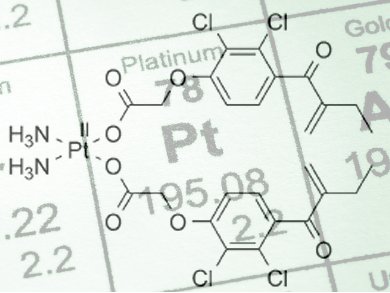Malignant pleural mesothelioma (MPM) is a rare and aggressive asbestos-related cancer. It is intrinsically resistant to both chemotherapy and radiation treatment. MPM is chemoresistant thanks to glutathione (GSH), which deactivates Pt-based drugs. Currently, all poly-chemotherapeutic protocols for treating MPM include cisplatin or carboplatin. Ethacrynic acid (EA) inhibits the enzyme that catalyses the conjugation between GSH and Pt-based drugs. A PtIV derivative containing a cisplatin
equatorial base and two axial EA anions, namely cis,cis,trans-diamminodichloridobis(ethacrynato)platinum(IV), 1, also known as ethacraplatin has been synthesized. The idea is that a bifunctional molecule composed of a Pt complex and EA
could combine the cytotoxic activity of the metal drug with lower chemoresistance.
Domenico Osella and co-workers, University of Piemonte Orientale Amedeo Avogadro, Italy, synthesized and charaterized the bifunctional EA–PtII complex 2 (cis-diamminobis(ethacrynato) platinum(II)). It contains two EA moieties as leaving groups. The complex was tested on four MPM cell lines. The resulting antiproliferative activity was compared with that elicited by the analogue PtIV complex ethacraplatin, 1, and by the co-administration of free EA and cisplatin.

The PtII and PtIV bifunctional complexes showed poorer performance than the reference drug cisplatin alone or in combination with EA. After treatment, cellular GST activity remained consistently unchanged, while the GSH level increased.
- Evaluation of Platinum–Ethacrynic Acid Conjugates in the Treatment of Mesothelioma
I. Zanellato, I. Bonarrigo, M. Sardi, M. Alessio, E. Gabano, M. Ravera, D. Osella,
ChemMedChem 2011.
DOI: 10.1002/cmdc.201100426




